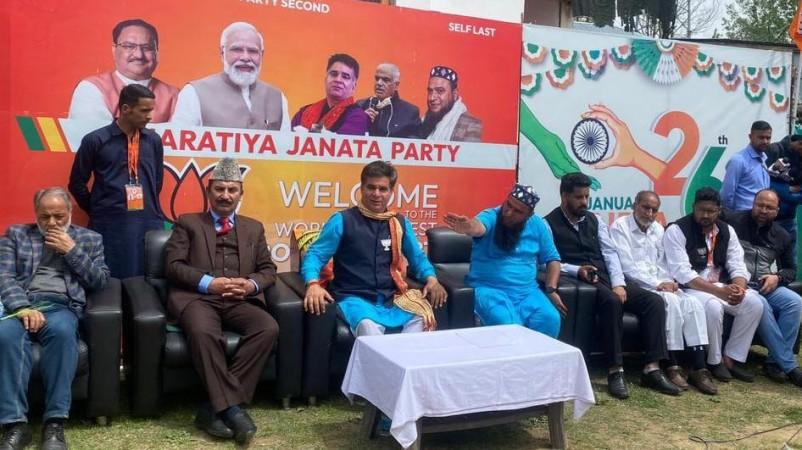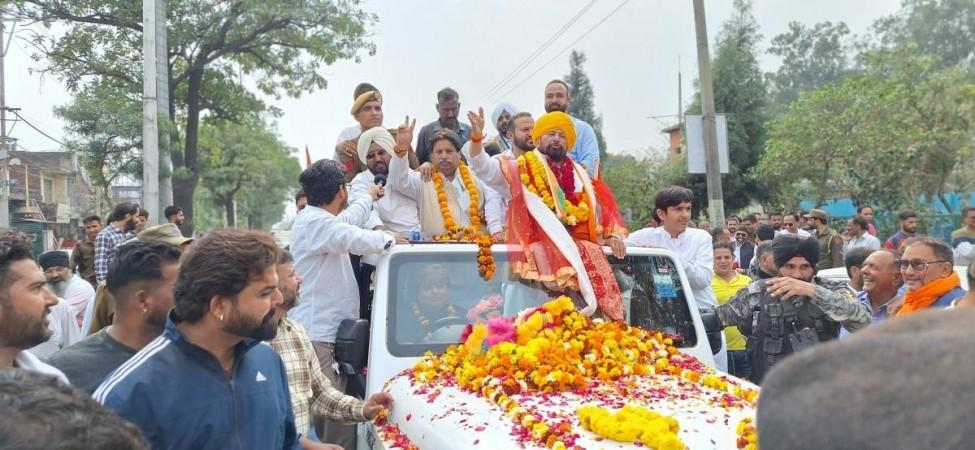
Despite the BJP's claims of widespread support during the recent Lok Sabha elections, the party has experienced a significant drop in its vote share. The BJP's vote share has fallen sharply from 46.2% to 24.36%, a concerning trend for the party.
This decline is particularly troubling as the BJP aims to secure over 50 seats in the upcoming assembly elections. The reduced vote share suggests that achieving this target may be increasingly difficult.
In the 2019 Lok Sabha elections, the BJP had emerged as the dominant political force in the former state of Jammu and Kashmir with a 46.2% vote share. This was a historic increase from 32.4% in 2014. Prior to this, in the 2009 elections, the BJP had secured 18.61% of the votes, which had increased to 46.2% by 2019.
In the 2014 Assembly elections in J&K, the BJP became the single largest party with 23% of the votes, followed by the PDP with 22.7%, the NC with 20.8%, and Congress with 18%.
Although the Congress party has improved its position in two seats in the Jammu province, its vote share has also decreased from 28.66% in 2019 to 19.38% in the 2024 elections. This decline is attributed to Congress's decision to support the National Conference in three Parliamentary segments of the Kashmir Valley. In 2009, Congress had 24.67% of the votes, which dropped to 22.9% in 2014.
Two BJP candidates, Dr. Jitendra Singh and Jugal Kishore Sharma, won both Udhampur-Doda and Jammu-Reasi Parliamentary seats with a margin of 1,24,373 and 1,35,498 votes,n respectively. In the 2019 Lok Sabha elections margins on both seats were over 3.5 lakhs.
Detailed Vote Share Changes:
BJP
- 2014: 32.4%
- 2019: 46.2%
- 2024: 24.36%
National Conference
- 2014: 19.11%
- 2019: 7.88%
- 2024: 22.30%
Peoples' Democratic Party
- 2014: 20.5%
- 2019: 2.39%
- 2024: 8.48%
Congress
- 2014: 22.9%
- 2019: 28.66%
- 2024: 19.38%
First time after 2009, Congress takes lead in BJP's bastions
For the first time since 2009, Congress has gained a lead in three assembly segments in the Jammu region, traditionally considered BJP strongholds.
In the 2009 Lok Sabha elections, the then-Congress candidate for the Jammu Lok Sabha seat, Madan Lal Sharma, led in eight Hindu-majority assembly segments. However, in the 2014 and 2019 Lok Sabha elections, Congress candidates failed to secure a lead in any Hindu-majority assembly segments of Jammu and Kashmir.

This time, despite losing the seat by a margin of 135,498 votes, Raman Bhalla managed to break the BJP's winning streak in Hindu-dominated assembly segments. He led the RS Pura-Jammu South and Suchetgarh assembly segments.
RS Pura-Jammu South: Bhalla received 44,162 votes compared to Jugal Kishore Sharma's 37,798 votes.
Suchetgarh: Bhalla secured 42,248 votes, while Sharma received 37,442 votes. Notably, in the 2019 Lok Sabha elections, Sharma had secured 38,998 votes in this segment, and Bhalla only had 9,835 votes.
The Suchetgarh assembly segment has been a BJP stronghold, except for the 2002 elections. Bhalla also performed well in the newly formed urban constituency of Bahu, which includes areas like Gandhi Nagar, Trikuta Nagar, and Channi Himmat. Sharma secured 37,702 votes in this segment, and Bhalla got 36,156.
In the Ramgarh (reserved) constituency, the contest was close with Sharma receiving 32,557 votes and Bhalla 30,929.
In the Samba assembly segment, another BJP stronghold, Sharma's lead decreased significantly from 39,421 votes in 2019 to 15,114 in 2024. Sharma's votes fell from 50,538 in 2019 to 39,670, while Bhalla's votes increased from 11,117 to 24,566.
The pattern was similar in the Jammu West Assembly segment, another BJP bastion. In 2019, Sharma secured 81,209 votes against Bhalla's 15,081, with a lead of 66,128. In 2024, Sharma received 42,612 votes and Bhalla 21,734, reducing the lead to 20,882.
In the Bishnah assembly segment, the BJP's lead reduced from nearly 40,000 votes in 2019 to just 4,736 votes in 2024.









!['Had denied Housefull franchise as they wanted me to wear a bikini': Tia Bajpai on turning down bold scripts [Exclusive]](https://data1.ibtimes.co.in/en/full/806605/had-denied-housefull-franchise-they-wanted-me-wear-bikini-tia-bajpai-turning-down-bold.png?w=220&h=138)



